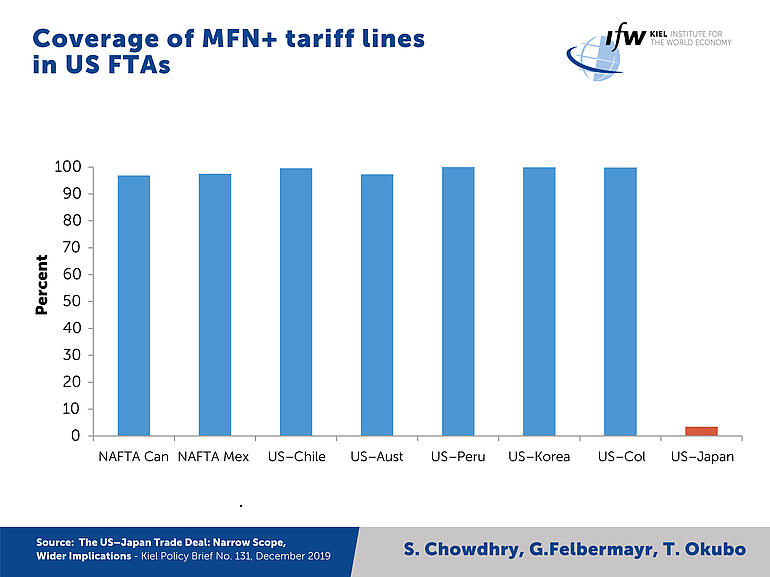News
USA–Japan Trade Agreement Violates WTO Criteria

The US tariff schedule lists only 241 tariff lines for which the US would eliminate or reduce customs duties over the transition period to Japan. These constitute just 3.4% of all tariff lines which other WTO member states face. The coverage is similarly limited on the Japanese side. Japan’s schedule covers approximately only 10% of tariff lines for US exporters. The trade agreement between the USA and Japan thus violates current WTO law. This is the conclusion reached by the authors of the Kiel Policy Brief "The US-Japan Trade Deal: Narrow Scope, Wider Implications", which includes Kiel Institute President Gabriel Felbermayr.
"The central basis of the WTO is the most-favored nation principle, according to which trade advantages must always apply to all WTO members in the same way. Exceptions are only permitted if bilateral agreements between WTO member countries liberalize substantially all trade, as is the case with the EU single market," says Felbermayr. "The trade agreement between the USA and Japan clearly violates this exemption from the most-favored nation principle. In principle, all WTO member countries would therefore be entitled to the trade liberalization agreed there, but no country seems to want to risk such a conflict with the USA."
Other bilateral trade agreements between the USA, for example with Canada or Mexico, are much more extensive and cover much more tariff lines, usually well over 90 percent.
The US tariff schedule lists only 241 tariff lines for which the US would eliminate or reduce customs duties over the transition period to Japan. These constitute just 3.4% of all tariff lines which other WTO member states face. The coverage is similarly limited on the Japanese side. Japan’s schedule covers approximately only 10% of tariff lines for US exporters. The trade agreement between the USA and Japan thus violates current WTO law. This is the conclusion reached by the authors of the Kiel Policy Brief "The US-Japan Trade Deal: Narrow Scope, Wider Implications", which includes Kiel Institute President Gabriel Felbermayr.
"The central basis of the WTO is the most-favored nation principle, according to which trade advantages must always apply to all WTO members in the same way. Exceptions are only permitted if bilateral agreements between WTO member countries liberalize substantially all trade, as is the case with the EU single market," says Felbermayr. "The trade agreement between the USA and Japan clearly violates this exemption from the most-favored nation principle. In principle, all WTO member countries would therefore be entitled to the trade liberaliztion agreed there, but no country seems to want to risk such a conflict with the USA."
Other bilateral trade agreements between the USA, for example with Canada or Mexico, are much more extensive and cover much more tariff lines, usually well over 90 percent.

Japan has liberalized 96 percent of its customs duties in its trade agreement with the EU (EUJEPA), and as much as 97 percent in the course of the Transpacific Partnership (CPTPP).
Key sectors for US exports to Japan, such as machinery and instruments, are not covered by the US-Japan agreement. Japan is opening its agricultural market for US products, but to a lesser extent than under EUJEPA and CPTPP. "The tariff concessions are also distributed asymmetrically in favor of the USA and reflect the comparatively weak position from which Japan started the bilateral negotiations", says Felbermayr.
“The USA’s focus in the agreement was clearly on agricultural products and services in the digital sector. The EU should use this obvious preference to its advantage in the negotiations with the USA on trade liberalizations.”
The authors warn that such bilateral small-scale agreements will become the rule within the WTO, for example to resolve trade disputes between the US and the EU. This would further undermine the WTO's rulebook and be detrimental to international trade as a whole.
Read the Kiel Policy Brief: "The US-Japan Trade Deal: Narrow Scope, Wider Implications"
